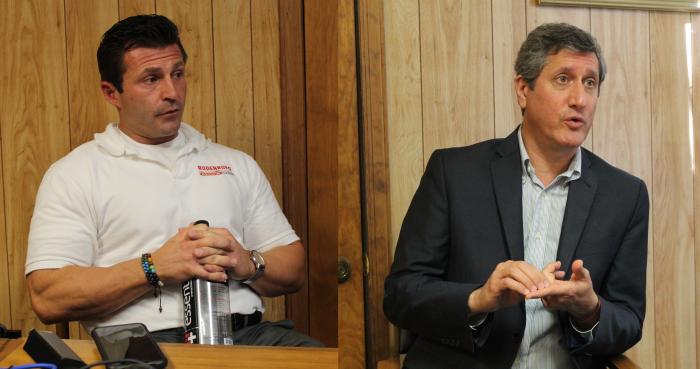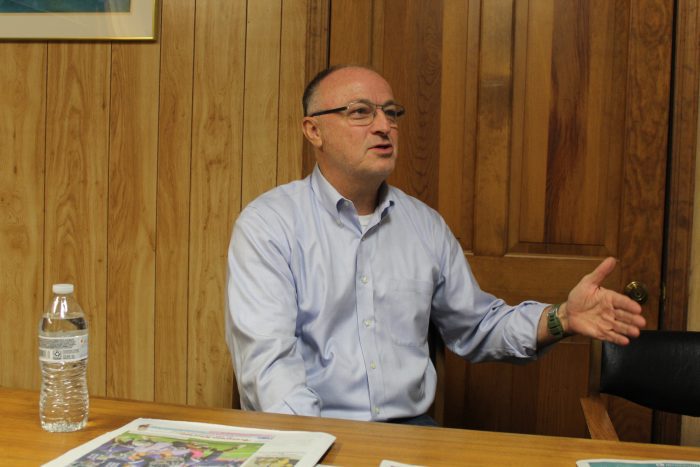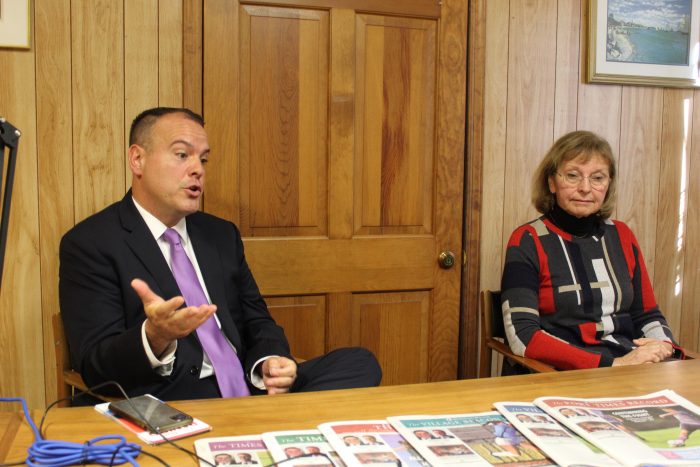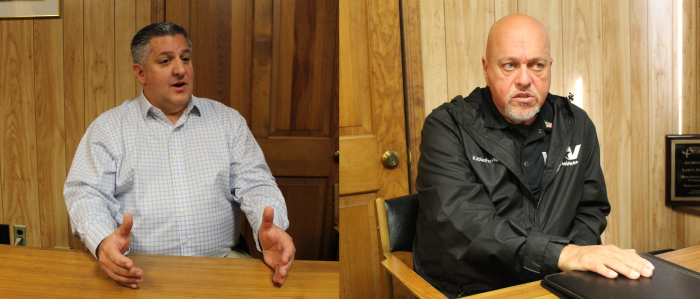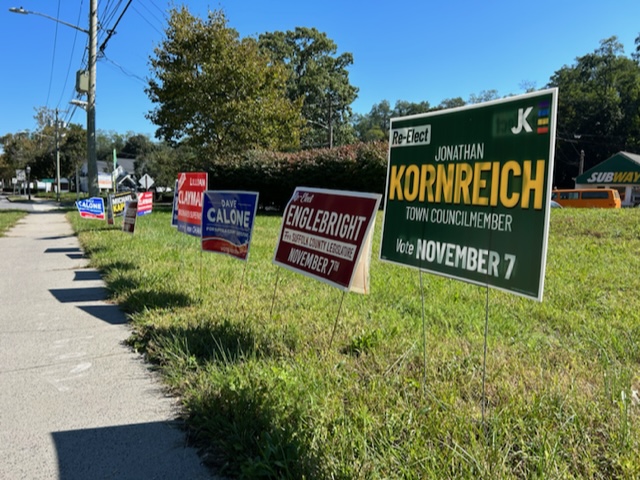By Mallie Jane Kim
Special education teacher and school administrator Gary Bodenburg (R) is challenging incumbent Councilmember Jonathan Kornreich (D-Stony Brook) to represent the Town of Brookhaven’s 1st Council District. The two faced off in a debate on local issues at the TBR News Media offices.
Bodenburg works in South Huntington’s school district and said he has spent a lot of time with at-risk populations, including students with special needs and victims of domestic violence. He said he thinks it’s important for average citizens to become “activated” for the benefit of the next generation.
“I’m trying to see the world through my 9-year-old’s eyes and make sure we make this place better and better each day,” he said.
Kornreich, who won his seat in a special election in 2021, has been a fixture in the Three Village area for years. He started his civic engagement with the board of North Shore Montessori School in Stony Brook when his kids were in preschool, then served on Three Village Central School District’s Board of Education and as president of Three Village Civic Association. He sees the town job as an extension of his deep personal interest in the community.
“I love serving the community,” he said. “It has nothing to do with the election — this is my life.”
Balancing redevelopment
Kornreich suggested the way to make redevelopment financially viable for developers is to have a mixed-use component, that is, build apartments on top of retail space like a grocery store, for example. This would also allow for more affordable housing for young people starting their careers and empty nesters downsizing, he said. But he cautioned that balance is key.
“We have to balance carrying capacity — How many people can our infrastructure, our roads, our single-source aquifer, our surface waters; how many people can this fragile little island support? — versus the need to redevelop blighted properties,” he said.
Bodenburg agreed redevelopment should balance environmental and quality-of-life concerns with the need for housing and safety. “When you see those buildings looking the way they are, it does attract undesirables to that area, and that just increases the issue of crime, and then we’re at a whole other set of spiraling,” he said, suggesting grants and other incentives for fixing up buildings and easing the burden on property owners.
Bodenburg acknowledged apartments above retail space could be useful for some, but he expressed concern about mixed-use buildings. He said residents he’s spoken to are not happy with the idea. “They do not want these apartment complexes, they feel it changes the character of their neighborhoods,” he said.
He also believed the town needs to act on the years of plans and studies for redevelopment in the area by working with local, county and state officials. “We’ve seen a lot of studying things to death with not necessarily something culminating or coming out of it,” he said, pointing to traffic backups he’d like to fix. “We need to start pulling the triggers on these things.”
Kornreich rebutted that redevelopment is something that happens over generations, and the studies are there to guide town decisions as the community changes happen over time.
“There’s no trigger to pull,” he said. “The Town of Brookhaven’s job is not to come in and tear buildings down and rebuild them according to the will of the community. This is an evolutionary process, and the visioning sets the long-term vision and roadmap for the way the community would like to see it.”
Kornreich added that mixed-use buildings would best go in already-built downtown areas, rather than within neighborhoods with single-family homes. He pointed to Patchogue as an example, with its many restaurants and walkable retail. “It’s a fun place in a preexisting downtown area. It’s really good reuse and redevelopment,” he said.
Landfill closure
Both candidates addressed the scheduled closing of Brookhaven’s landfill as a looming budgetary crisis, as it has brought sizable public revenue into the town’s coffers every year. They agreed that lack of planning over the past decades means the burden for making up the difference will largely fall to taxpayers.
Bodenburg said he’d go through the town budget to see where belts can be tightened, pointing to his experience as lead negotiator for his teachers union contracts. “Any time you’re looking at a major budget deficit, you have to start looking at other areas in order to cover those losses,” he said. “Negotiating [outside] contracts, making sure we’re getting the most bang for the buck when we’re hiring and contracting services for the town.”
Kornreich pointed to a wind-farm deal that should help make up some of the difference. He added that after he came to office and learned there was not much advanced planning, he was part of a group that rezoned the land around the landfill from residential to industrial, to make way for a solar farm that would also bring in revenue.
This was not a popular act with his party, he said. “I paid a political price, but it was the right thing to do because it was part of this process — at least from where I’m sitting — of scrambling now to try to fill that hole.”
Working across the political aisle
Kornreich has been the only elected Democrat in town government, something he said he has not let become an issue for him. “I’m the minority leader on the Town Board,” he joked. Calling himself a moderate Democrat, he said he’s made a point to work well with his colleagues across the political aisle.
“I’m trying to show that Democrats are people who are interested in good government and we’re interested in supporting the economy and supporting working people, supporting families and supporting kids,” he said. “We don’t have to get involved in the partisan warfare, and we can work together.”
Bodenburg said he, too, was not interested in political squabbles, and said “fake boundary lines that exist on paper” would not hold him back from working with all community members and other elected officials.
“My intentions are community-based — our kids, our families — and whatever is best for our community,” he said, adding that he would like to see more cohesiveness in the town. “I steer clear of politics and any type of issue that will throw a wrench in what’s best for our community.”
Kornreich’s willingness to work with Republicans has landed him in tricky situations, like with a vote in favor of the controversial town redistricting map last year. He said that vote, like many others he has taken, represented a compromise, and he is not a “bomb thrower” to vote “no” on policy he was part of helping to create.
“Is it a map that I would draw or support if I were in control? Absolutely not, no way. But it’s 6-1, so when you’re negotiating 6-1, I could take a performative vote and just vote ‘no,’” he said, clarifying that previous draft maps had significantly worse gerrymandering than the final version, and that the final map kept his district together. “Sometimes you’ve got to take a bad vote. You could choose bad or you could choose worse, and sometimes you have to choose bad — and that’s one of the realities of this job.”
Council District 1 voters will choose who will represent them when they hit the polls Tuesday, Nov. 7.

